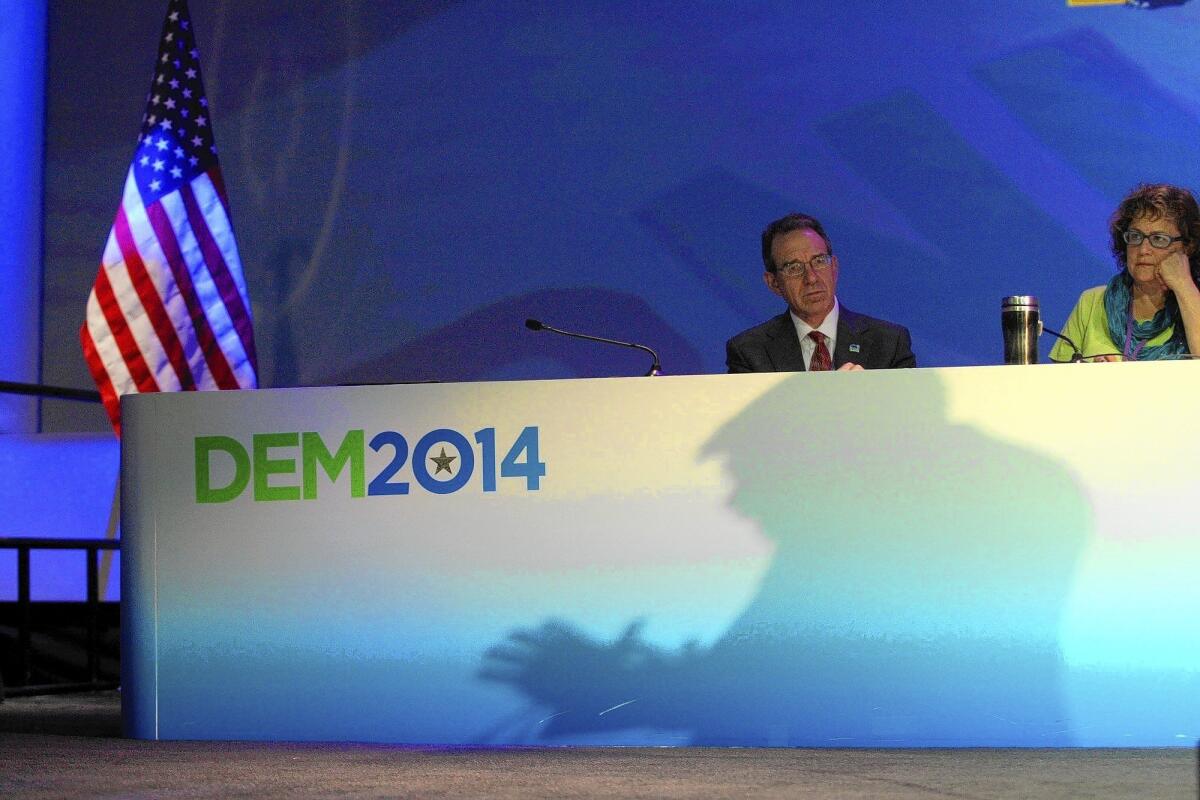State Democrats’ meeting ends on fractious note

- Share via
California Democrats broke with Gov. Jerry Brown by calling for the legalization of marijuana and a ban on “fracking” in the state party’s official platform Sunday.
The Democrats’ support for decriminalizing and taxing recreational cannabis and putting a stop to fracking sparked no debate — only cheers — at the Los Angeles Convention Center. Delegates unanimously approved the moves by voice vote on the final day of the party’s annual convention.
Although neither issue is likely to make or break the biggest contests in this election year, the breach highlighted the recurrent tensions between the liberal impulses of party loyalists and the more moderate inclinations of a Democratic governor.
Brown had warned last week of the perils of legalizing marijuana. “How many people can get stoned and still have a great state or a great nation?” he said on NBC’s “Meet the Press.”
And although he has approved restrictions on fracking, an oil and gas drilling technique that environmentalists say is dangerous, the governor has also suggested it might offer California some economic opportunities. Fracking opponents heckled Brown’s otherwise well-received speech to several thousand Democrats at the convention Saturday.
The clash fit a tradition of California governors disappointing party activists. At a state Republican convention in 1991, conservatives tarred and feathered an effigy of GOP Gov. Pete Wilson in protest against a tax hike he had signed.
On Sunday, as the Democratic gathering drew to a close, it was clear the party that has achieved extraordinary dominance of America’s most populous state is nonetheless grappling with the limits of that power.
Many of the elected officials present, including Brown, hailed the results of what has effectively been one-party rule in Sacramento — new rights for immigrants in California illegally, such as wide access to driver’s licenses, and a rise in the minimum wage, for example. And while Democrats elsewhere fear a voter backlash over Obamacare, party leaders in California touted its benefits for the uninsured.
But one of the Democrats’ top goals in this election year is to regain the veto-proof supermajority they recently lost in the state Senate when two lawmakers — one indicted, one convicted — took paid leaves. Democrats are also battling to preserve their two-thirds supermajority in the Assembly.
Complicating those tasks: Some of the most fiercely contested races will take place in regions where liberal orthodoxy often does not play well, such as Orange and Riverside counties, the High Desert and the Central Valley.
State Assemblyman Steve Fox, a Democrat from Palmdale, “is not going to be for the legalization of marijuana” in his reelection campaign, said Allen Hoffenblum, publisher of a nonpartisan election guide.
“A shrewd campaign consultant knows how to steer a candidate away from ... a party’s platform” if it’s indefensible in his or her district, Hoffenblum said.
Projections of low voter turnout in November are inauspicious for Democrats. Unlike in 2012, the party will not have the benefit of a Democratic president at the top of the ticket.
“We could lose seats,” Bob Mulholland, a veteran Democratic strategist, conceded.
But party leaders are taking solace in the demographic trends that in 2012 led to the party’s first supermajority in both houses of the Legislature since 1883 — especially a rise in Latino voters, who tilt heavily toward Democrats.
“In California, red to blue is not a slogan — it is our reality,” Assembly Speaker John A. Pérez (D-Los Angeles) told delegates Sunday.
A supermajority in both houses enables the dominant party to raise taxes, override a governor’s veto, write constitutional amendments and propose bond issues, all without Republican votes.
Brown’s resistance to new spending constrained Democratic lawmakers from restoring all of the deep budget cuts imposed during the economic downturn. State Democratic Chairman John Burton recalled one legislator telling him, “We don’t want to do too much,” for fear of losing the supermajority.
Even after the loss of the Senate supermajority last week, Senate leader Darrell Steinberg told delegates Saturday that spending for preschool for every 4-year-old in California was at the top of Democrats’ agenda this spring.
“We will find a way — while living within our means — to also invest more money … in children zero to 3, so that they’re ready for preschool at age 4,” Steinberg told the crowd.
Brown, who is seeking a historic fourth term as governor, did not include money for the pre-kindergarten program in his budget. A cornerstone of his reelection campaign is his success in guiding California out of an era of chronic budget shortfalls, largely through tax hikes that he persuaded voters to approve but also because of a rebounding economy.
Neither fracking nor marijuana is likely to sway many voters in a race that Brown is well positioned to win, at least for now. And that is fortunate for him: Polls suggest that on both issues, most Californians side not with the governor but with his party.
Responding to the anti-fracking hecklers Saturday, Brown suggested he welcomed the dissent.
After ticking off his list of steps that California is taking — and others that he said it still needs to take — to reduce its reliance on fossil fuels and fight global warming, he shouted at them:
“Keep protesting! But add a bunch of more stuff.”
More to Read
Sign up for Essential California
The most important California stories and recommendations in your inbox every morning.
You may occasionally receive promotional content from the Los Angeles Times.











